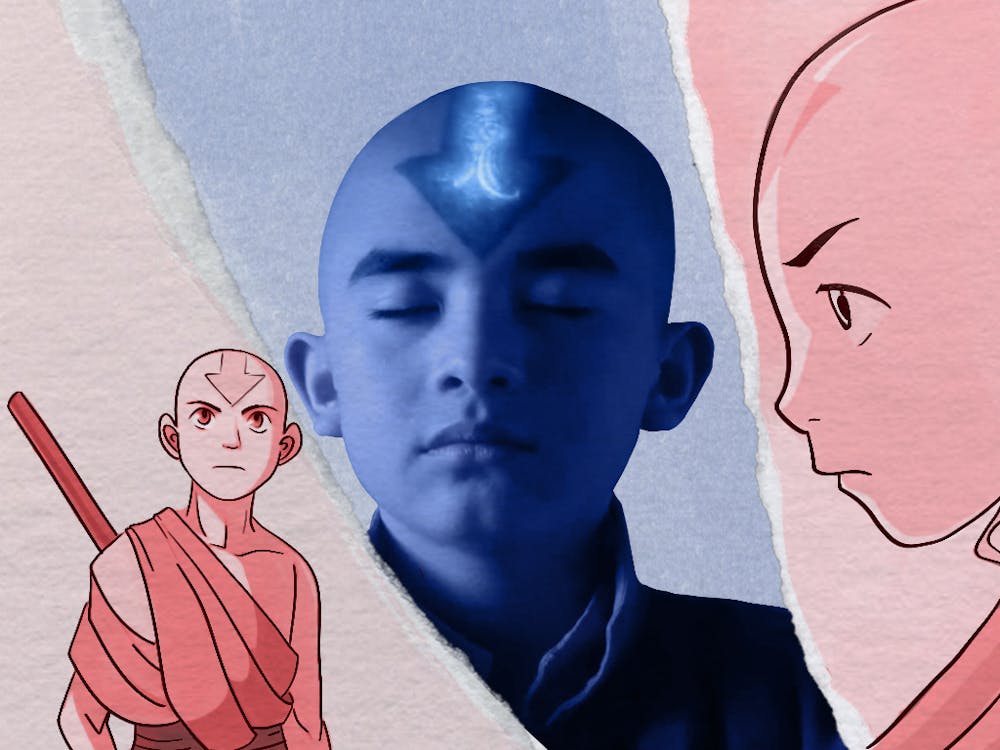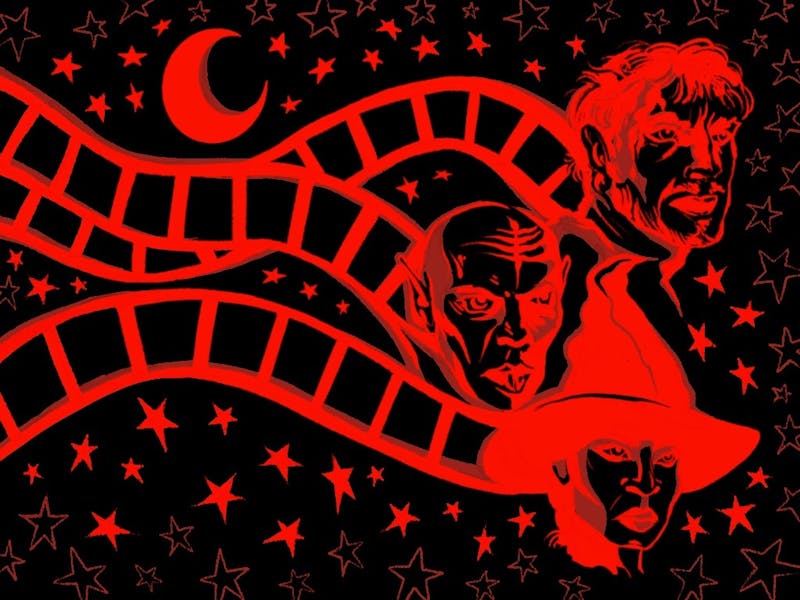Why is Hollywood obsessed with remakes? Why is Hollywood obsessed with live-action remakes? Watching Netflix's "Avatar the Last Airbender (2024)" does not answer any of these valid questions, but you might have fun in spite of yourself.
"Avatar the Last Airbender (2024)" had its fair share of enemies from the start—an army of skeptical Gen Z and millennials fueled by nostalgia, anime fans who had been burned by Netflix before and the many other wary admirers of the original show, to name a few. To make matters worse, production of the show drew further scrutiny after original showrunners Michael DiMartino and Bryan Konietzko exited the project in 2020, citing non-specific creative differences. In 2021, when a casting report was leaked onto social media, the reactions were mostly positive, viewing many of the choices as beneficial for Asian and Indigenous representation, but the casting of Ian Ousley as Sokka stirred controversy. It was discovered by fans that Ousley was not authentically Cherokee because the tribe he claimed ancestry from, the Southern Cherokee Nation of Kentucky, is not recognized federally or by any of the three recognized Cherokee tribes. This and other gripes with the show were hotly debated online and in-person, leaving many people divided on how to feel about the adaptation.
However, whether you were cautiously rooting the show on or praying for its downfall, there's a lot to be pleasantly surprised about. And although this reboot never manages to escape the shadow of its animated predecessor, it tries with an earnestness that echoes the original's spirit, if not its innovation.
The initial season of "Avatar the Last Airbender (2024)" follows the broad strokes of the original’s first season, otherwise known as “Book One: Water.” Aang, the Avatar and a fun-loving air nomad played by Gordon Cormier, meets the rest of the show’s core trio, Sokka and Katara, played by Kiawentiio, after he becomes unfrozen in the Southern Water Tribe. Upon discovering that 100 years have passed and that the world has been engulfed in war by the Fire Nation, the group must set out for the Northern Water Tribe.
The group’s journey progresses with considerably fewer detours than the original as the show struggles to convert 20 episodes’ worth of content into eight hour-long installments. This leaves the pacing admittedly uneven, with some plots stretching thin over the increased run-time and other episodes attempting to pack in too much. For example, the two episodes set in Omashu present a clumsy amalgamation of a multitude of storylines: including those concerning Jet and his gang, The Mechanist, King Bumi's duel with Aang, season two's Cave of Two Lovers, as well as an early introduction for Azula. The result was overall disjointed, and the choppy way in which the original stories were combined feels inorganic and ineffectual.
Despite this, the series’ heart helps to patch over some of the bumpiness. In particular, the relationship of fan favorites Zuko, played by Dallas Liu, and his Uncle Iroh, played by Paul Sun-Hyung Lee, is given more attention, to the benefit of the entire season. Liu's performance is emotional and nuanced, but still maintains the harsh edge of the original character, and additional scenes from Zuko's past serve to flesh him out even more. The contrast between the bright-eyed, vulnerable Zuko in the flashback to Lu Ten's funeral and the battle-hardened one who exists in the present is heartbreaking. Furthermore, the incredibly angsty teen and his tea-obsessed uncle have a refreshingly natural rapport and, both separately and as a unit, help convey the complexity the show is known for. Even the most stoic viewer might let a few sniffles escape after Zuko and Iroh’s emotional hug in Episode 8. Sokka and Katara’s sibling dynamic is also compelling and still relatable even as their relationship illustrates how children can be affected by wartime pressures. Additionally, Aang’s sweet sincerity as he tries to adjust to his role as the Avatar is endearing, even as the series downplays his childish sense of humor.
However, though Aang's character remains likable, his lack of levity is emblematic of a problem with the show as a whole. The absence of the silly adventures and jokes that made the original so fun is sorely felt, and, in many places, Netflix’s remake takes itself entirely too seriously. By doing so, it misses the opportunity to replicate the contrast between light humor and insightful commentary that was so fascinating in Nickelodeon’s "Avatar: The Last Airbender." This is most obvious through the adaptation’s Aang, who seems to be stuck in a grueling emo phase, but the problem is woven into the structure and format of the show itself. Many light-hearted moments were left out entirely, and the series’ buoyancy was partially lost in its transition to live action. It doesn’t help that much of the humor that lands in the show comes directly from the original’s script or is unintentional, such as Zhao’s hilariously over-the-top speech about how he is going to steal the moon.
This lack of comedy is made even more unfortunate given that the adaptation also dilutes the opposing side of the contrast. The original depth of its commentary is tempered as the show speed-runs or omits character arcs, specifically of Team Avatar. Sokka's unlearning of the patriarchal ideas of the Southern Water Tribe, which was initially a major development for him in Book One, is cut out entirely due to a misguided effort to be more feminist. Instead, this decision only removes complexity from Sokka's character and demonstrates how this remake underestimates its audience in a way the original never did. On the other hand, while no part of Katara's character is removed, her character is toned down, especially her short temper and ferocity. The show also hurries to resolve Aang's avoidance of his Avatar responsibilities by making his decision to leave the Southern Air Temple seem like a temporary one, rather than a conscious escape. Aang's character seems more akin to his Book Three animated counterpart, which leaves the character with less room to grow as the show goes on.
Despite this, the adaptation managed to retain its entertainment value and dynamic visual appeal. The action sequences are captivating and look technically challenging, especially Katara and Paku's water-bending duel and Zuko's stint as the Blue Spirit. Behind the scenes, the cast began learning all the styles of bending, which are all based on different forms of Chinese martial arts, over Zoom well in advance of filming. Stunt coordinator Jeff Aro wanted the show's main players to have a foundation in all four disciplines, so they could create their own unique styles of fighting that reflected their travels. In addition, Aro intended for the combat scenes to further develop the characters and world, saying "the hesitation is to be too stunt-y on a project like this, where our vocabulary needs to be carefully chosen [for] the world that we’re helping create."
Furthermore, the vibrant production design highlights the distinctive nations of the Avatar-verse and each new locale that Team Avatar visits holds its own appeal, notably King Bumi’s palace and the city of Agna Qel’ a. And to add to these already gripping scenes, the colorful costumes and intricate armor influenced by Asian and Indigenous cultures make a huge visual impact—an impact only strengthened by the fact that those wearing them are mostly Asian or Indigenous actors. Yue’s Party City wig aside, the sets and costumes conveyed the diversity and aesthetic of the original show beautifully.
Overall, "Avatar the Last Airbender (2024)" is worth the watch if you're willing to put any nostalgia or lofty expectations aside, but regardless of whether you can live with this adaptation, the Avatar-verse has a couple of eventful years to come. Netflix has renewed its remake for two more seasons, while original creators DiMartino and Konietzko will begin production on a new Avatar animated film this year. Whether the adaptation will learn from its mistakes remains unknown, but Avatar fans might as well buckle up and enjoy the ride.



